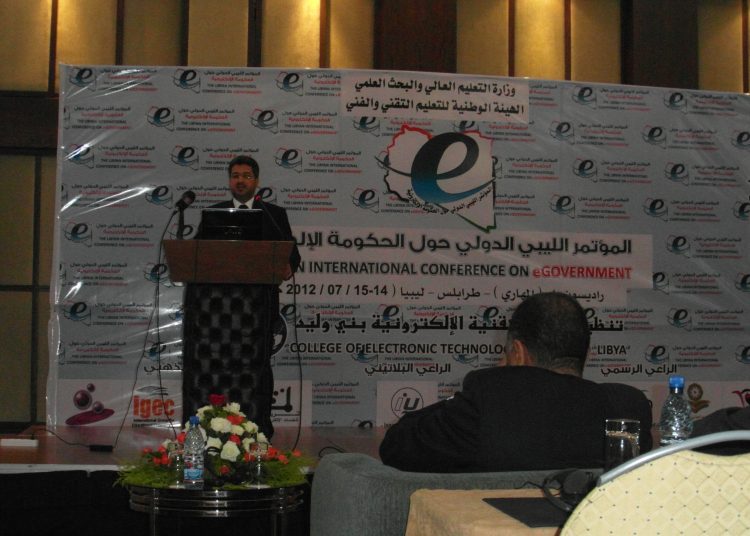By Sami Zaptia.
Tripoli, 28 July:
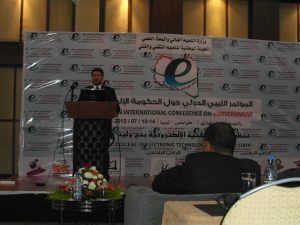
Eight major recommendations were made at the conclusion of the Libyan International Conference on e-Government, held on . . .[restrict]14-15 July at the Radisson-Mahary hotel in Tripoli.
The recommendations of the conference were:
- The conference emphasizes that the choice of e-government and the adoption of information and communication technologies as the basis for services and electronic transactions between the government and the citizen, and the government and the business sector, and among different sectors of government, is not an alternative to raising the efficiency of government performance, transparency and accountability.
E-governments will help satisfy the service needs of citizens and ensure the involvement of citizens in the management of the state. And that the option of e-government is the basis for raising the efficiency of government administration, which is the basis to build a society of justice, development and prosperity in future of Libya.
2. To emphasize that e-government will not achieve its objectives unless it is applied within an integrated strategy for the development and management of the administration, whose aim and goal is to serve the citizen. This strategy must include an integrated package of requirements such as the revision of organizational structures and process, the re-engineering and the development of relevant legislation, the qualification and motivation of human resources, and the development of telecommunications infrastructure.
3. To emphasize that the strategies, programmes and e-government initiatives are significant and should involve in discussion, review and evaluation all relevant parties inside and outside government, including the academic institutions and the private sector and civil society institutions.
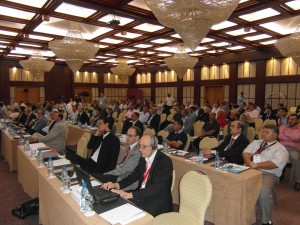
4. There should be an emphasis on sustainable development as a way to plan and implement programs and e-government initiatives so that the outcome of the long-term rehabilitation of cadres and competencies capable of running a national industry and a knowledge-based economy at the local level and international level.
This may include the following methods:
I. Giving priority to local Libyan companies in the implementation of e-government projects until they reach the capabilities of foreign companies or the imposition of national private sector involvement with the foreign partner where it is necessary to assign projects to a foreign companies.
II. The adoption of the method of centers of excellence in the development of e-government applications and the implementation of its projects, the integration of specialized training programs with job training and implementation of projects, as well as the use of business incubators for small and medium-sized projects.
III. The adoption of Free and Open-Source Software as a basis for technology transfer in software and the achievement of independence and capacity development. And by requiring all ministries and government institutions not to use any commercial software, especially in the server side, except in cases where no efficient, safe, appropriate, FOSS alternative is available.
5. Emphasis on the lessons learned from the experiences of the leading countries in e-government and the adoption of framework for the regulatory body or bodies overseeing the planning and implementation of policies, programs, projects and e-government initiatives so that:
- It is in direct contact with the top of the pyramid of power in the state and have the binding force to impose its policies, plans and standards for all institutions and ministries of the government.
- II. Clarity of responsibilities and powers of each of the entities related to the e-government project so as to eliminate duplication and overlap and lack of clarity of terms of reference and facilitate follow-up and accountability.
- III. Emphasis on the involvement of all state institutions and ministries involved in all stages of planning, implementing and operating programmes, projects and e-government initiatives to which they relate.
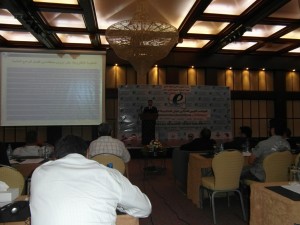
6. With the emphasis on the importance of developing a national strategy for e-government, this can be launched quickly and even before the completion of this strategy including the following ways:
I. By the implementation of “quick success” projects with a high return rate and a relatively low cost which are non-technically complex and offer solutions to urgent problems facing citizens. These would thereby make the citizen feel the importance of e-government significantly in their daily lives.
II. Initiate the “e-mail to each state-employee” programme as one of the ‘quick-success’ projects giving rapid high-yield and for a relatively low cost.
III. Review and assess what existing projects related to e-government such as the National Number and the Single Window of Foreign Trade and others, and determine whether it is feasible to continue with them, or they need correction and completion, in order to preserve what has already been invested in them. This continuation should be on the basis that all these projects are put under the direct supervision of the competent authorities in charge of e-government.
IV. The implementation of infrastructure projects for communications so as to provide internet access every Libyan citizen whatever their place of residence.
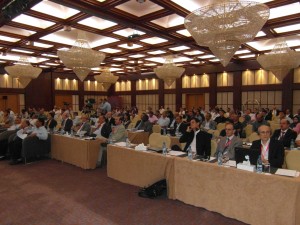
7. To emphasis on the government’s commitment to protecting the privacy of the citizen and the government’s commitment to secure and protect the information it collects from or about its citizens from the unauthorized leakage or misuse. And that this commitment must be provided for constitutionally and legally.
8. To emphasize the importance of public awareness about e-government through media channels and curricula, conferences and workshops with a focus on educating workers in different sectors of government and targeted e-government programs in the future. It is within this emphasize that we need to assure the need to continue to hold the international conference on Libya’s e-government on an annual basis so that it is an annual event to bring together specialists and review and evaluate e-government.
We can also benefit from the successful experiments carried out by some of the leading countries in e-government by holding a workshop each month on an ongoing basis throughout the year. The workshop can discuss the specialized topics of interest to a sector or specific sectors of the government or a specific technical aspect will be covered at length in the presence of specialists and hosting local or international experts in the field.
END OF RECOMMENDATIONS
For archive stories on this topic see:
http://www.libyaherald.com/?p=10549
[/restrict]


